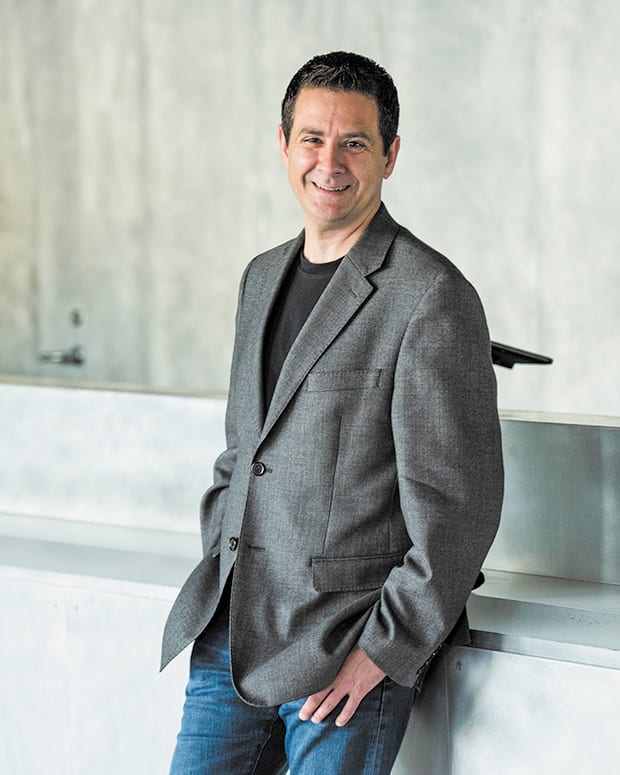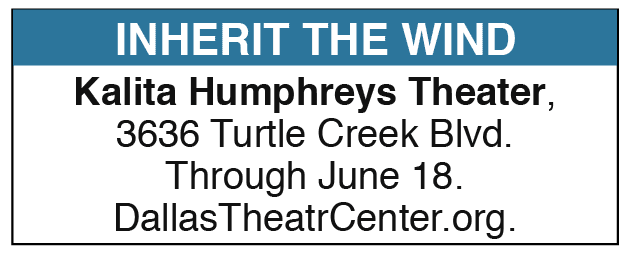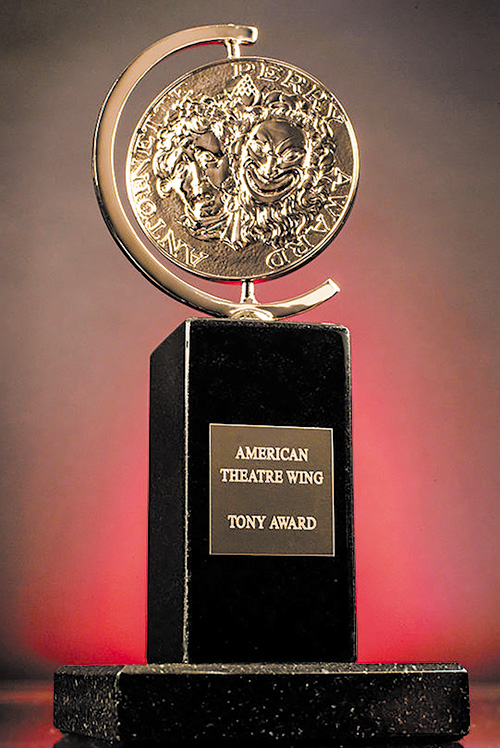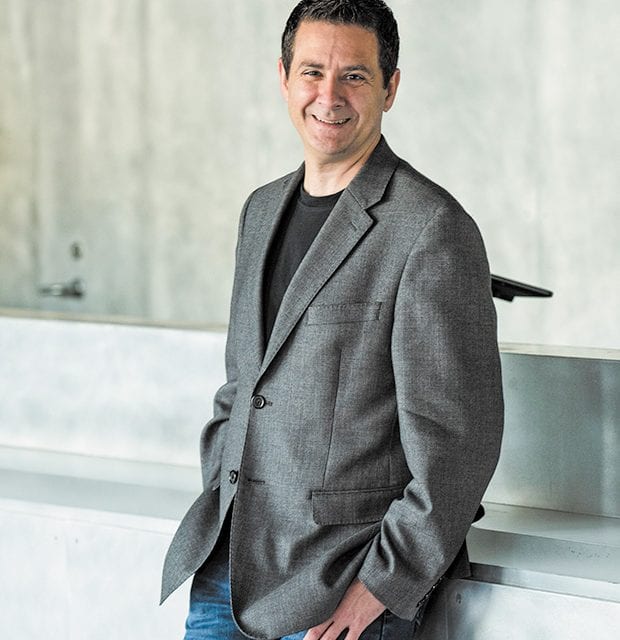Just honored with the regional theater Tony Award, DTC’s Kevin Moriarty takes on the classic play ‘Inherit the Wind’ in an era of fake news

Moriarty will accept the Tony Award with managing director Jeffrey Woodward on June 11. Until then, he still has to get ‘Inherit the Wind’ off the ground. (Photo by Karen Almond)
ARNOLD WAYNE JONES | Executive Editor
On Sunday, June 11, a lot of producers, actors, directors and designers will be sitting in Radio City Music Hall, waiting on tenterhooks to learn whether they will win a Tony Award.
 But not Kevin Moriarty. He’ll be as cool as his high-energy self can be. Because he knows he’s already won.
But not Kevin Moriarty. He’ll be as cool as his high-energy self can be. Because he knows he’s already won.He’d probably object to the characterization that he won the Tony Award for best regional theater, which is being presented to the Dallas Theater Center, where he has served as artistic director for a decade. It was a group effort.
“The award recognizes a sustained body of work, and in that way, I feel it is really a celebration of [former A.D.s] Paul Baker and Ken Bryant and Richard Hamburger and the other countless civic leaders who have spent so much time and money” sustaining the DTC, he says. “It has been almost overwhelming emotionally to connect with so many folks [who have reached out to me since the announcement on May 1] and seeing them and reflecting back.”
But even with the coveted medallion in hand, there’s no rest for the weary. Moriarty is smack-dab in the middle of previews for his newest production as a director, a revival of Lawrence and Lee’s legendary 1956 play Inherit the Wind. While fictionalized, the play clings closely to the actual events that took place in Dayton, Tenn., in the summer of 1925, when two giants of the courtroom — famed defense attorney Clarence Darrow (here called Henry Drummond) and revered orator William Jennings Bryan (Matthew Brady) — face off in a battle for the will of a town… and a nation. Their battleground: Whether Darwin’s theory of evolution can rightly be taught in a public high school.
The real-life Scopes “Monkey” Trial was its own historic lawyer-vs.-lawyer moment in the first quarter of the 20th century, but the ideas it embodies — the clash between scientific fact and religious faith — resonates just as plainly for Moriarty more than 90 years later.
 “It’s such a solid play, such an honor to work on one of those great American plays where everything just works,” he says. “The character of Hornbeck [a stand-in for stinging journalist H.L. Menken] wrote so brutally, so caustically [about William Jennings Bryan] — much more biting than even Rachel Maddow would be today about Trump.” It resonates to modern ears as potently as it did more than half a century ago. And that definitely featured in Moriarty’s decision to present the play.
“It’s such a solid play, such an honor to work on one of those great American plays where everything just works,” he says. “The character of Hornbeck [a stand-in for stinging journalist H.L. Menken] wrote so brutally, so caustically [about William Jennings Bryan] — much more biting than even Rachel Maddow would be today about Trump.” It resonates to modern ears as potently as it did more than half a century ago. And that definitely featured in Moriarty’s decision to present the play.“More than a year ago, when I picked the play [for this season], I was really thinking about global warming and how some people are not able to recognize the scientific truth of that, but it has gotten only more complicated in a world of alternative facts and fake news,” Moriarty says. “The first week of our rehearsal, the Dallas Morning News ran stories on three consecutive days about language in the current education curriculum about how to treat evolution. Evolution is not settled even now in Texas! How do we, as a nation of laws, grapple with what truth is allowed to be spoken when we don’t all agree on what a ‘fact’ is? When facts don’t lineup with ideology or faith, how do we reconcile that?”
It’s an issue that nettles Moriarty as a gay man as much as a theater artist. He grew up in a conservative religious family in the heartland in the 1970s and ‘80s, but even his strict Catholic parents acknowledged evolution. And pointless naysaying merely muddies what should be settled.
“So much of the marriage equality movement in the last decade was able to advance because of court cases that centered around facts [instead of ideology]. Opponents said it was it was ‘damaging for children to be raised by a single-sex parents.’ But that was a lie — we had the facts, and so animus was the only reason to oppose it — but animus can’t be the reason.”
Moriarty respects spiritual beliefs, but draws a distinction where that impinges on orderly governance. Indeed, issues of morality inform a lot of his work, including his last directorial effort, Electra (whose theatrical innovations probably contributed to the DTC’s Tony win).
“Electra poses a complicated moral question about when is the price of taking action against injustice too high. There’s not a factual answer to that question. And in [our earlier production of] The Christians [which posits whether there really is a hell] there is no factual answer in — there is only human interpretive understanding. That’s like much of the political ideology. But that’s different than the post-enlightenment world that the United States of America has always lived in — where there are empirically recognized facts, and there is no space for an opinion about a fact.”
Even so, Moriarty was amazed on the first day of rehearsal when giving his “overview” speech to the cast about Inherit the Wind. He explained how educated, enlightened, 21st century folks such as they might find it difficult to relate to the reactionary and closed-minded characters that populate the play. He admits he was surprised by the hushed response from many gathered there.
“One by one, more than half the actors in the play told personal stories of their own journeys to grappling with an accepted fact as separate from biblical teachings,” Moriarty says. “Some didn’t fully grasp the issue until their mid-twenties — meaning after they went to college. It was a shock to me to realize there are people for whom scientific notions can threaten their faith.”
But that’s sort of the point of well-crafted theater: To challenge audiences, sometimes even the actors themselves, to struggle through their ambivalence and still be entertained. Indeed, it might be that kind of engagement that wins Tony Awards.
Editor’s note: The date of the Tony Awards, which had been reported as June 4, has been corrected to June 11.
This article appeared in the Dallas Voice print edition May 19, 2017.

